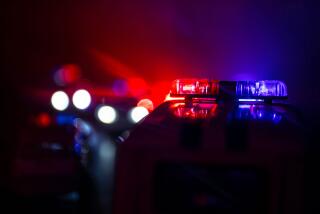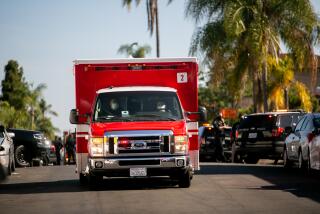No Holes When Lives Are at Risk
- Share via
Many Americans bought cellular telephones for immediate access to emergency help, but it hasn’t always worked out that way.
For instance, your 911 call might not go through if you’re in one of your cellular service’s weak transmission areas. Yes, every cell phone is equipped with the means to use either of a region’s competing cellular signals, but you won’t automatically be switched to the stronger one. The companies block that option out of a competitive concern that the opposition might have a better signal in an area that is important to you. And, if you are out of state, your 911 attempt might not go through because you’re not a subscriber to the local network.
The Federal Communications Commission is aware of these problems. In June 1996, for example, it approved new rules that required wireless carriers to put 911 calls through whether or not the caller was a local subscriber. But the October start date for compliance now has been pushed back to the end of this month, while the cellular industry argues against the change.
We are talking about emergencies here. There should be no further delays on the new FCC rules. The commission should also force compliance and adopt a rule that allows a 911 caller to be switched automatically to the strongest signal in the area, presuming there is a competing service. That means no more signal blocking.
Next, cellular phone companies should be required to inform customers of dead or weak signal areas in their service range. That alone should spur competition on improved technology.
The industry is also concerned about losing business if there is a federal rule allowing all cell phone owners to make 911 calls even if they have not subscribed to a cellular service. Well, regular service can be prohibitively expensive and some who own cell phones for security reasons cannot afford to subscribe. If the cell phone companies are concerned about losing subscribers, they ought to think about more competitive pricing. The federal policy of permitting just two cellular companies per service region makes little sense for that very reason. It inhibits competition.
Until these remedies take place, consumers can take some basic precautions. Know your location when you dial 911 because the technology for automatic tracking is still in the test stage. You can find the weak service areas along your normal driving routes by keeping your phone on and periodically checking the signal strength. If the FCC and the cellular industry do what they should, and soon, you won’t be on your own in these matters for too long. But any delay is unacceptable for what is supposed to be an emergency service.
More to Read
Inside the business of entertainment
The Wide Shot brings you news, analysis and insights on everything from streaming wars to production — and what it all means for the future.
You may occasionally receive promotional content from the Los Angeles Times.










